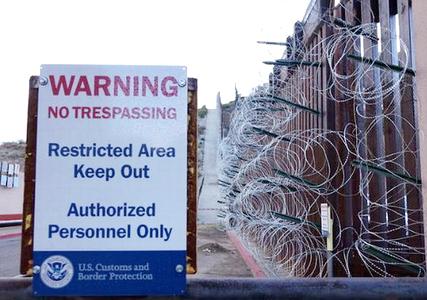
WASHINGTON, DC, October 20, 2020 (ENS) – The U.S. Supreme Court Monday agreed to rule on whether the Trump administration must stop building sections of the southern border wall with Mexico. The administration is appealing a lower court decision that it illegally diverted money appropriated by Congress for military salaries and pensions to the wall project.
The nonprofit American Civil Liberties Union, ACLU, which represents the plaintiff nonprofit organizations Sierra Club and Southern Border Communities Coalition in the lawsuit, has said it would seek to tear down illegally built sections of the wall if it wins the case.

But, whatever the Supreme Court decides, its effect on the presidential election, already in progress, will be nil.
The Supreme Court is unlikely to hear the case before inauguration day, January 20, 2021, and if President Donald Trump loses re-election, a Democratic administration headed by former Vice President Joe Biden could stop construction or even remove completed sections of the wall.
Vicki Gaubeca, director of the Southern Border Communities Coalition, a program of Alliance San Diego that represents more than 60 organizations along the border, said, “We’re confident in the strong merits of our case.”
“Trump’s attempts to sidestep Congress is a direct assault on the checks and balances that represent the bedrock of our democracy. We will continue to push against the further militarization of our communities and for a new border vision that expands public safety, protects human rights, and welcomes all people to our region,” Gaubeca said.
The Sierra Club is warning that, “Construction of President Trump’s border wall is desecrating ancestral and burial lands, destroying protected landscapes, and threatening wildlife.”
“The Trump administration has misused military funds for the construction of a wall that has caused lasting harm to the ecosystems and communities of the borderlands, damaged sacred Indigenous lands beyond repair, and destroyed wildlife and habitats along the border,” said Gloria Smith, managing attorney at the Sierra Club.
Smith said, “Stopping this wasteful and irreversible damage is long overdue, and we look forward to making our case before the Supreme Court.”
Twice the Supreme Court has allowed the border wall construction to continue, even after the U.S. Court of Appeals for the 9th Circuit ruled in June that the administration had illegally maneuvered around Congressional rejection in transferring $2.5 billion of Defense Department funds to build the wall.
The Ninth Circuit Court of Appeals concluded that Congress “declined to provide additional funding for projects in other areas, and it declined to provide the full $5.7 billion sought by the President: it is for the courts to enforce Congress’ priorities, and we do so here.”

In July, when the justices last acted by a 5-4 vote, Associate Justice Stephen Breyer wrote in dissent that the court’s action, “I fear, may operate, in effect, as a final judgment.”
Dror Ladin, senior staff attorney with the American Civil Liberties Union, said, “Everyone knows that Trump failed to get Congress to fund his xenophobic wall obsession and every lower court that has considered the case has found that the president has no authority to waste billions of taxpayer dollars on construction.”
The case that the Supreme Court will hear this winter originated in the 35-day partial government shutdown that began in December 2018 when Republicans controlled both Houses of Congress.
Only Congress, not the Presidency, has the power to appropriate funds. So, Trump’s demand that $5.7 billion in federal funds for a U.S.–Mexico border wall go into the appropriations bill to fund the federal government for the 2019 fiscal year, led to an impasse in negotiations when Congress refused.
A Republican-controlled Senate unanimously passed an appropriations bill without wall funding and a Republican-controlled House of Representatives appeared likely to follow suit.
Trump finally ended the longest government shutdown in history on January 25, 2019 after Congress gave him roughly $1.4 billion for the wall.
To secure the border wall funds denied him by Congress, a frustrated President Trump declared a national emergency on the southern border not quite three weeks later.
He may have believed that the national emergency declaration gave him cover to move funds from other government accounts to construct sections of the wall.
The money Trump identified at that time included $3.6 billion from military construction funds, $600 million from the Treasury Department’s asset forfeiture fund and the $2.5 billion in Defense Department money.
The case before the Supreme Court involves only the $2.5 billion in Defense Department military salary and pension funds that Trump earmarked for constructing about 80 miles of border barriers in Arizona, California, and New Mexico. Much of that stretch of the wall now has been built.
Also in the courts, states are winning decisions against Trump’s border wall funding diversion.
On October 10, California Attorney General Xavier Becerra secured a favorable decision from the Ninth Circuit Court of Appeals in a multistate lawsuit challenging the Trump administration’s illegal diversion of $3.6 billion dollars from over 120 military construction projects to build the border wall.
In a separate lawsuit, Attorney General Becerra challenged the Trump administration’s diversion of more than $3.8 billion in funds that Congress appropriated to the Department of Defense. More than 20 percent, $890 million, of those funds had been allocated to National Guard units across the country for the purchase of equipment critical to responding to natural disasters and other emergencies. Litigation in that case is ongoing.
On behalf of the Southern Border Communities Coalition, Gaubeca said, “Trump’s vanity wall has led to the destruction of our environment, risks extinction of endangered wildlife, and has desecrated tribal, sacred lands, all to become a narcissist’s campaign prop. We need to put an end to immoral, inhumane and wasteful border policies and usher in a new era where people are safe and where we treat others with dignity and respect.”
Copyright Environment News Service (ENS) 2020. All rights reserved.



